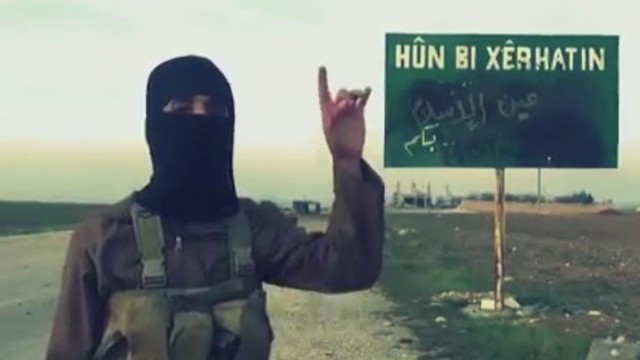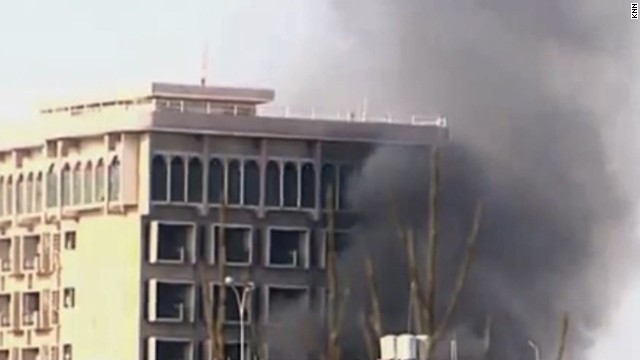
Two
purported ISIS fighters interviewed for a news agency working in
ISIS-held territory have given the same reason for the militants'
retreat from the Syrian city of Kobani: the constant pummeling by
coalition airstrikes.
On Monday,
Kurdish fighters declared that they had released the city on the border
to Turkey from ISIS' grip after 112 days of fighting.
The
efforts of the Kurdish fighters -- known as the YPG, or People's
Protection Units -- on the ground were backed by an extensive campaign
of airstrikes by the U.S.-led international coalition against ISIS.
And
according to the interviews given to ISIS aligned Amak news agency in
Syria, it was those airstrikes that won the battle for Kobani, referred
to by the fighters as Ayn Al-Islam.
"Recently,
we have withdrawn from Ayn Al-Islam bit by bit, because of the
airstrikes and deaths of a number of our brothers," said one of the two
fighters, his face covered apart from his eyes.
He points to a scene of destruction behind him but vows that ISIS will persist, "and this is the message we send to Obama."

ISIS launches assault on Iraqi city of Kirkuk 02:27
The
second fighter, interviewed by Amak stood near a road sign reading Ayn
Al-Islam. He said ISIS forces had raided 360 villages around Kobani,
from which the defenders "ran away like rats."
But
the reason behind their withdrawal from the city, he said, "is that we
no longer had places to hold there. We were inside Ayn Al-Islam and we
occupied more than 70%, but the airstrikes did not leave any building
standing, they destroyed everything."
His horror of the airstrikes was apparent.
"I
swear by God, their planes did not leave the air, day and night; they
did airstrikes all day and night. They targeted everything. They even
attacked vehicles; they have not left a building standing."
ISIS assault on Kirkuk
ISIS is on its heels after the loss of Kobani and an offensive by Kurdish Peshmerga -- armed fighters who protect Iraq's Kurdish region -- around Mosul, Iraq's second-largest city and a focal point for all sides in the conflict.
But on Friday, the Sunni extremist group launched an assault on Iraq's oil-rich city of Kirkuk in what may be an attempt to divert Kurdish troops from Mosul.
A
report by Rudaw, a private website dedicated to presenting news from a
Kurdish perspective, said at least 30 ISIS fighters were killed in the
assault and 15 captured.
Casualties on
the other side included Brig. Gen. Shirko Fateh, the highest-ranking
operational commander of the Peshmerga brigade located in Kirkuk.
Deaths in Kobani
According
to the Syrian Observatory for Human Rights, a London-based opposition
group, from October 6 to Monday the fighting for Kobani killed 979 ISIS
combatants, 324 YPG fighters and 12 rebels backing the YPG.
Thirty-eight
more ISIS militants died in attacks using booby-trapped vehicles or
bomb belts, and the ISIS shelling of Kobani killed 12 civilians, SOHR
said.
"On the other hand, hundreds of
(ISIS) militants died during U.S. and Arab allies' airstrikes on the
city and its countryside," the group said.
However, the success of the coalition airstrikes in Kobani will be hard to replicate elsewhere.
There
are almost no civilians left in the city of Kobani, and most residents
left early on when the fighting started, especially in the contested
areas close to the frontline.
This
meant airstrikes were fairly straightforward, with the coalition able to
target one side and avoid civilian casualties. The frontline was well
defined, so it was clear where the ISIS and Kurdish fighters were.
A
more challenging situation is when airstrikes seek to target ISIS
inside populated areas like Mosul in Iraq, Raqqa in Syria and other
cities under ISIS control.
Here the
effectiveness of airstrikes is limited because of the risk of casualties
among civilians. When coalition airstrikes hit cities in Aleppo, in
northern Syria, civilian deaths were reported last year.
No comments:
Post a Comment